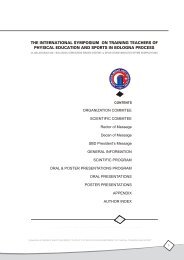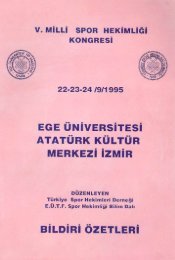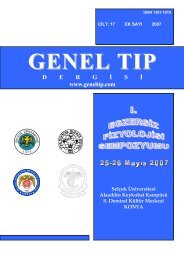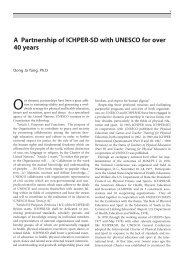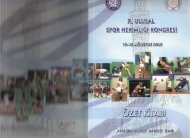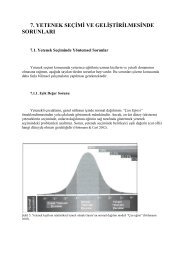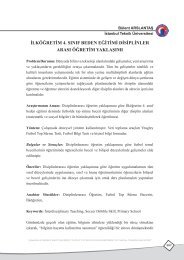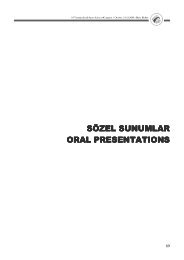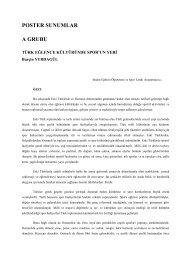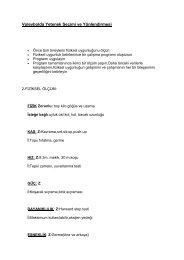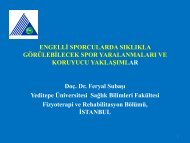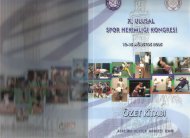KARDÄ°YORESPÄ°RATUVAR EGZERSÄ°Z TESTLERÄ° ... - Spor Bilim
KARDÄ°YORESPÄ°RATUVAR EGZERSÄ°Z TESTLERÄ° ... - Spor Bilim
KARDÄ°YORESPÄ°RATUVAR EGZERSÄ°Z TESTLERÄ° ... - Spor Bilim
You also want an ePaper? Increase the reach of your titles
YUMPU automatically turns print PDFs into web optimized ePapers that Google loves.
7.ULUSLARARASI SPOR BİLİMLERİ KONGRESİ27-29 EKİM 2002KONGRE - PANELLERThe symptoms of jet-lag include a periodic and particular inability to concentrate, an unusual ‗head buzz‘,tiredness, inability to sleep at the new night-time, loss of appetite, digestive discomfort. The symptoms aretransient and gradually disappear.In general jet-lag is more severe and lasts longer the more time-zones that are crossed. It is lessfollowing a flight to the west compared to a flight eastwards across a similar number of time-zones. The reasonis that the natural time period of the innate circadian rhythm is slightly more than 24 hours so the body adaptsmore easily to a delay (required after travelling west) than to an advance (after flying east) of the body clock.This principle applies to a delay of up to 13-14 hours and to an advance of 8-9 hours. In flying from the UK toAustralia or New Zealand, the body clock may adjust by either means, irrespective of the fact that the flight wasin an easterly direction.Soccer teams may have to compete in conditions where one of the contestants is at a chronobiologicaldisadvantage. An example is the play-off contest for final positions in the 2002 World Cup. Iran had 3 days toadjust to the local time in Dublin for the first leg of the play-off with Ireland. Both teams then had 3 days toadjust for the second match in Tehran. Uruguay overcame its disadvantage of a round trip to Australia tosecure a qualifying victory in Montevideo, also in November 2001. Incomplete adjustment for the first leg wouldhave led to an advantage on return home over the more severely jet-lagged opponent. South American clubstravelling to Japan (e.g. in order to compete against the European club champions) experience a maximal timezonetransition of 12 hours. In all these cases the team with the better travel strategy can gain an edge over itsrival.2. The body clockThe disruption of the body‘s circadian system is the root cause of jet-lag. The term relates to the generalmalaise that prevails until the body clock adjusts to become synchronised with the new environment.The human body is naturally attuned to being active and alert during the daytime and to sleeping at nighttime.This cycle of activity and rest fits with the light-dark alternation in the environment. The so-calledcircadian rhythm – circa meaning around and dies being Latin for a day – is regulated by cells in thehypothalamus, deep within the brain. The rhythm is fine-tuned to an exact 24-hour period by factors external tothe ‗body clock‘ such as patterns of eating, social activity, environmental temperature and so on. A key factor inthe regulation of the system is the hormone melatonin. This substance is secreted by the pineal gland withinthe brain, its release being triggered by darkness and inhibited by light. Its effects include a lowering of bodytemperature and an increase in drowsiness, both promoting conditions for sleep to occur.There are many rhythms that are harmonised with the body‘s circadian system. These follow the rhythmsin core temperature shown in Figure 1a. One example is the pace at which athletes spontaneously choose toexercise given the choice (Figure 1b). It explains why there is a natural reluctance against exercising early inthe morning and a preference towards early evening when resting body temperature is at its high point.Figure 1. The circadian rhythm in rectal temperature (a, left) and in self-chosen exercise intensity (b, right).347



